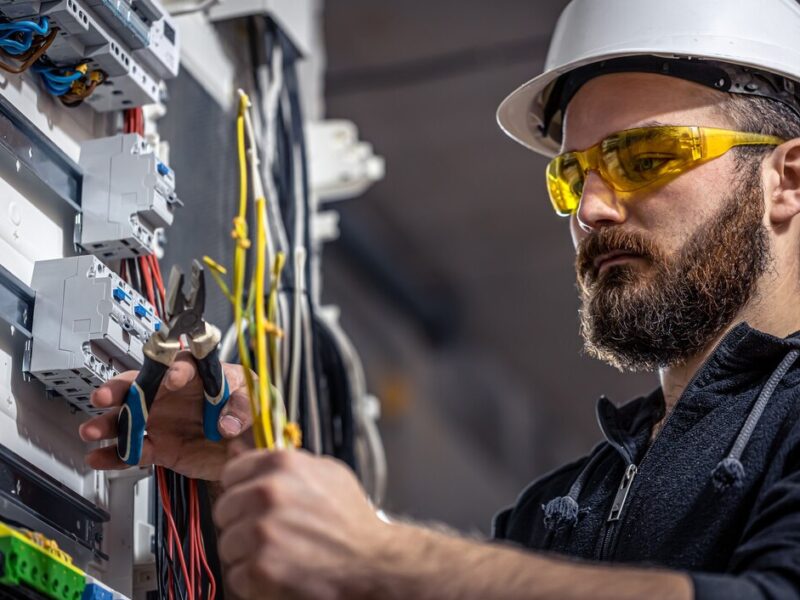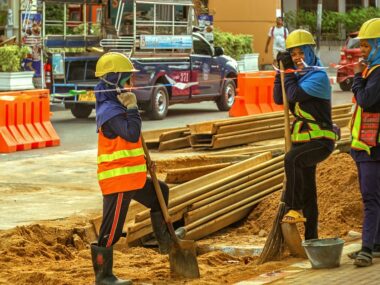If you’re an experienced electrician wanting to take your career to the next level, Spain is the ideal destination for you.
With its successful construction and infrastructure sectors, Spain provides countless opportunities for skilled electricians, and the best part? You can secure these high-paying jobs with visa sponsorship.
What Are Visa Sponsorship Electrician Jobs in Spain?
Visa sponsorship for electrician jobs in Spain allows foreign nationals to legally work in Spain while having their visa application supported by their employer. This process ensures that electricians who aren’t from the European Union (EU) or European Economic Area (EEA) can live and work in Spain legally. It opens up opportunities for professionals in Spain’s booming construction, industrial, and infrastructure projects, where the demand for skilled electricians remains consistently high.
Why Spain?
Spain is one of Europe’s most attractive countries for foreign workers, thanks to its thriving job market, beautiful climate, and high standard of living. The Spanish construction industry, in particular, has been growing steadily due to the continuous demand for housing, commercial buildings, and infrastructure development. These projects require skilled electricians, making Spain an ideal destination for professionals in the electrical trade.
By securing a visa sponsorship for electrician jobs in Spain, you gain access to not just a job, but a secure career with the possibility of long-term residency, excellent salary packages, and numerous lifestyle benefits.
Available Electrician Job Roles in Spain 2025
The demand for electricians in Spain is wide-ranging, offering numerous job roles across different sectors. Whether you’re interested in residential, commercial, or industrial electrical work, Spain has a position that can match your skills. Here are the main electrician job positions available in Spain:
1. Electrician
Electricians in Spain are responsible for installing, maintaining, and repairing electrical systems in homes, businesses, and industrial settings. As an electrician, your duties will include:
- Installing electrical wiring for new buildings, homes, and renovations.
- Testing electrical systems to ensure they meet safety standards.
- Diagnosing electrical problems and carrying out repairs.
- Upgrading electrical systems to improve efficiency.
You’ll need to be skilled in handling a range of electrical systems, from residential lighting to complex industrial power systems.
2. Electrical Technician
Electrical technicians play a crucial role in supporting the work of electricians by ensuring electrical equipment operates efficiently. As an electrical technician, your responsibilities will typically include:
- Installing and maintaining electrical systems.
- Troubleshooting electrical faults and carrying out repairs.
- Upgrading and improving electrical equipment to ensure safety and functionality.
This role requires strong technical skills, knowledge of electrical systems, and an understanding of safety codes.
3. Electrical Supervisor
Electrical supervisors in Spain are responsible for overseeing electrical work on larger projects, ensuring that everything runs smoothly and safely. As a supervisor, your job will be to:
- Monitor and manage electrical teams on-site.
- Ensure compliance with electrical codes and safety regulations.
- Inspect work to ensure quality standards are met.
- Liaise with project managers and contractors to discuss progress and resolve issues.
This role is perfect for those with extensive experience in the electrical field and strong leadership abilities.
Salary and Benefits of Visa Sponsorship Electrician Jobs in Spain
One of the most attractive features of working in Spain as an electrician is the potential to earn a competitive salary, along with a range of additional benefits. Spain has a reputation for offering some of the best compensation packages for skilled tradespeople, including electricians.
Salary Expectations for Electricians in Spain
The salary for electricians in Spain can vary based on your level of experience, the type of job, and the region in which you’re working. On average, electricians in Spain can expect to earn between €2500 and €7500 per month. Here’s a breakdown:
- Entry-level Electrician: €2500 to €3500 per month.
- Mid-level Electrician: €3500 to €5000 per month.
- Senior Electrician: €5000 to €7500 per month.
Experienced electricians with specialized skills, such as knowledge of industrial systems or renewable energy, can expect to earn towards the higher end of this salary range. Additionally, many electricians in Spain earn extra compensation for overtime work or specialized projects.
Other Benefits
In addition to a competitive salary, electricians in Spain with visa sponsorship are entitled to a wide range of benefits:
- Health Insurance: All sponsored employees receive health coverage under Spain’s public health system, which provides high-quality medical services.
- Social Security: Your salary will contribute to social security, ensuring that you have access to pensions, unemployment benefits, and other social services.
- Job Security: With the ongoing demand for electricians in Spain, job stability is almost guaranteed, especially as construction and infrastructure projects continue to expand.
- Pathway to Residency: Visa sponsorship can pave the way for long-term residency and, eventually, citizenship, allowing you to settle in Spain permanently.
- Family Sponsorship: In many cases, visa sponsorship also extends to immediate family members, enabling you to bring your spouse and children with you to Spain.
Education and Skills Required for Electrician Jobs in Spain
To be eligible for a visa sponsorship electrician job in Spain, applicants must meet certain education and experience criteria. Here’s a breakdown of what’s required:
1. Educational Qualifications
- Auxiliary or Lone Ranger Degree/Diploma: You’ll need at least a diploma in electrical engineering or a related field. In some cases, an apprenticeship or vocational training may be sufficient.
- Certifications: Having additional certifications in specific electrical systems or technologies (such as solar power or industrial systems) will make you more competitive in the job market.
2. Experience
- 1-2 Years of Experience: Employers generally require at least one to two years of experience in electrical work, particularly in the type of work you’ll be doing in Spain (residential, commercial, or industrial).
3. Skills
- Electrical Codes and Safety Protocols: You must have a deep understanding of electrical codes and safety standards, ensuring that all work complies with Spanish regulations.
- Technical Expertise: Proficiency in the installation, repair, and maintenance of electrical systems and equipment is essential.
- Communication and Teamwork: Electrical work often requires collaboration with other professionals such as engineers, architects, and construction managers, so strong communication skills are important.
- Adaptability: Being able to adapt to different types of electrical work and new technologies will make you a more desirable candidate.
How to Apply for Visa Sponsorship Electrician Jobs in Spain
Step 1: Research Available Jobs
Begin by searching for visa sponsorship electrician jobs in Spain. Many online job portals list these types of roles, including websites like LinkedIn, Indeed, and specialized job boards in the construction and trade industries.
Step 2: Prepare Your CV and Documents
When applying, you’ll need to submit a CV that highlights your electrical qualifications, work experience, and any relevant certifications. Ensure that your CV is tailored to the job and adheres to the Spanish style of CV formatting. You’ll also need the following documents:
- Educational certificates and diplomas.
- Proof of work experience and references.
- Passport or identity documents.
Step 3: Apply Online
Once your documents are ready, apply for jobs directly through the job listing portals. Some employers may also require you to apply via email or their own website.
Step 4: Interview Process
If your application is successful, you will likely be invited for an interview, either via video call or in person. Be prepared to discuss your experience, skills, and why you want to work in Spain.
Step 5: Visa Sponsorship Process
Once you’re selected, the employer will initiate the visa sponsorship process. This involves submitting your documentation to the Spanish authorities, and upon approval, you will receive your work visa.
Why You Should Consider Electrician Jobs in Spain
1. High Quality of Life
Spain offers a fantastic quality of life with a relaxed lifestyle, stunning beaches, and world-renowned cuisine. The cost of living in Spain is relatively low compared to other European countries, making it an attractive place to work and live.
2. Career Growth
Working in Spain allows electricians to gain experience with European standards, enhancing their skills and qualifications. This experience can open doors to further career opportunities, both within Spain and internationally.
3. Diverse Job Opportunities
From residential projects to large-scale infrastructure developments, electricians in Spain have the opportunity to work on a variety of projects. This diversity provides a chance to gain experience in multiple areas of the electrical trade.
Frequently Asked Questions About Visa Sponsorship Electrician Jobs in Spain
- Are electricians in demand in Spain? Yes, the demand for electricians is high due to Spain’s thriving construction and infrastructure sectors. As older workers retire and new projects emerge, skilled electricians are needed to meet the increasing demand for electrical work.
- What is the average salary for electricians in Spain? The average salary for an electrician in Spain ranges from €30,000 to €43,000 annually, with higher pay available for more experienced professionals and those working in specialized roles.
- What qualifications do I need to apply for electrician jobs in Spain? You need a degree or diploma in electrical engineering or technology, along with relevant experience. Knowledge of Spanish electrical codes and safety protocols is also highly valued.
- How do I get a visa sponsorship for electrician jobs in Spain? Employers in Spain offer visa sponsorship for electricians. Once you have a job offer, the employer will initiate the visa application process, including submitting the necessary documents to the Spanish authorities.
- Can I bring my family with me to Spain? Yes, most visa sponsorship programs allow you to bring your spouse and children with you. Family members will need to apply for dependent visas.
- What is the work culture like for electricians in Spain? The work culture in Spain emphasizes work-life balance, with many electricians enjoying regular working hours and weekends off. Spanish workplaces are known for their collaborative and supportive atmosphere.
- What types of electrical work will I be doing in Spain? Electricians in Spain work on a variety of projects, including residential, commercial, and industrial electrical installations, maintenance, and repairs.
- Are there career advancement opportunities in Spain for electricians? Yes, electricians in Spain can progress to supervisory roles, specialize in certain electrical systems, or even transition to project management positions.
- What is the cost of living in Spain for an electrician? The cost of living in Spain is generally lower than in other Western European countries. Housing costs vary by region, with larger cities like Madrid and Barcelona being more expensive than rural areas.
- How long does the visa process take for electricians? The visa process can take between 1 to 3 months, depending on the type of visa and the specific requirements. It is best to apply as soon as possible after receiving a job offer.






